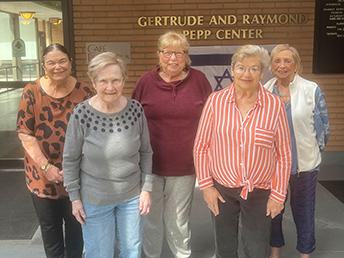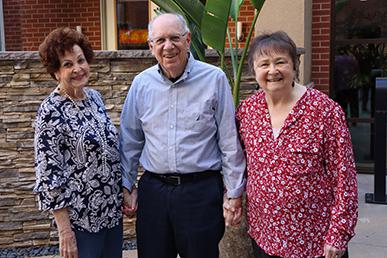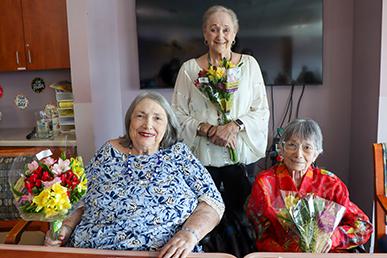Los Angeles Jewish Health: Where Resident Councils Ensure Everyone Has a Voice


Los Angeles Jewish Health: Where Resident Councils Ensure Everyone Has a Voice
Supporting the right to freedom of speech has always been a central tenet of American culture. At Los Angeles Jewish Health, we take this right to heart, ensuring every one of our residents, participants, and members has a voice and is heard. One of the most impactful ways this occurs is through an active resident council process on each of our campuses.
Resident councils at LAJH are elected bodies that are very much independent and led by the residents themselves. Council leaders engage other residents to participate in discussion and even debate around issues that have impact on their day-to-day campus experiences. Although the structure of the councils varies depending upon the campus facility (some have co-presidents, others have multiple vice presidents, and still others have positions such as parliamentarian), each is based on the same deep-seated commitment to representation. Residents are chosen by their peers to represent their interests and to partner closely with LAJH leadership to achieve the best and most fair outcomes for everyone. The councils are a tangible example of the teamwork that goes into care for all at LAJH.
“Through a democratic process, the councils give residents a say in ways that make them feel invested in the governance of their communities,” says Annette Weinberg, LAJH’s campus lifestyle and enrichment director for Eisenberg Village and liaison to resident councils in the Newman Building and Fountainview. “They’re absolutely vital to resident life.”
During meetings held each month, residents hear updates from council officials and from LAJH leadership on issues that range from selection of furniture for the common areas of campus to transportation logistics to ideas of what should be offered on ever-changing menu selections.
“Our town halls are a wonderful opportunity for residents to get involved with whatever might be happening at the time,” says Marcia Mass, president of the resident council at the Newman Building. “Recently, we offered input on some planned upgrades here at Newman that included new carpeting, new lighting, and fresh paint. It’s so exciting to see how our opinions can make a difference!”

For Sue Richter, co-president of the resident council at Fountainview, running for a seat was a natural extension of the volunteer leadership work she has carried out throughout her life. “I was president of my temple sisterhood; I’m that type of person,” she says. “Moving to Fountainview is the best thing I ever did, and being on the council allows me to give back. It’s a fantastic way to keep residents up to date and let the administration know how we feel on a particular topic.”
Co-president Bill Green also has a history of working with Jewish organizations as a lay leader, prior to arriving at Fountainview two and a half years ago. Through his role on the council, he has gained crucial insight into how LAJH works and ways he can help his fellow residents share their creative ideas.

“When Sue and I started our terms, we found we could bring up any topic we wanted,” he recalls. “For instance, we recommended there be a full-time registered nurse at Fountainview during the week. Working through the council, we collaborated with the administration; they agreed and made it happen. I’ve found that LAJH administration is very receptive to dialogue. It’s terrific because our residents are realizing that, if there’s a change or improvement they’d like to see, they can have influence through the resident council.”
Susan Leitch, director of therapeutic activities at the Joyce Eisenberg Keefer (JEK) Medical Center, helps facilitate JEK’s resident council. She says the council there is truly invaluable.
“During each meeting, residents sit down with our administrator/CEO, chief mission officer, director of nursing, our infection preventionist, our director of social services, our maintenance and housekeeping leads, the heads of our dietary and laundry departments, and me. We gather to hear residents’ accolades, comments, or concerns,” she says. “There’s so much benefit to having the council: Residents are empowered knowing they can effect change in their own home.”
The JEK council’s officeholders, Linda Zweig (president), Lois Schindel (vice president), and Barbara Fallick (secretary), echo Susan’s enthusiasm.

“I’m always thrilled to see how many people are in the room at our meetings each month,” Linda says. “To me, it’s an indication of how much the residents care about building their community.”
Lois is grateful the council can serve as a practical tool for residents seeking support. “It’s a great forum for people to interact and identify whom to contact about an issue that they’d like to see addressed,” she says.
Every meeting begins with a reading of the minutes from the previous month’s gathering. “I love doing that because when we review what we talked about last time and then move onto current business, we can reflect on how much has been accomplished,” Barbara says. “Seeing that progress is very affirming—it shows all of us residents that we matter!”
Elaine Mark, president of the resident council in the Taper Building, notes that there are other upsides to the councils, as well. Now in her third term on the board, Elaine has seen first-hand how resident participation translates to a more cohesive community.
“Because of the councils, we’ve all gotten to know each other better, and that’s ended up leading to greater participation in our activities, which is wonderful,” she says. “It’s also opened up lines of communication with our administrators. They are eager to partner with us, and their support makes LAJH a very easy place to live.”
